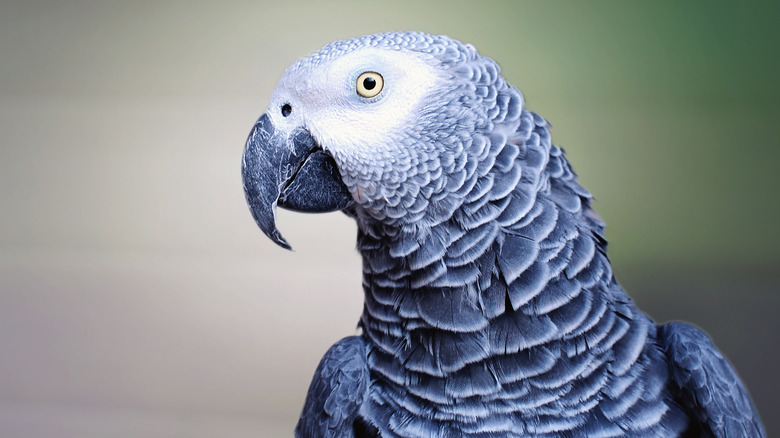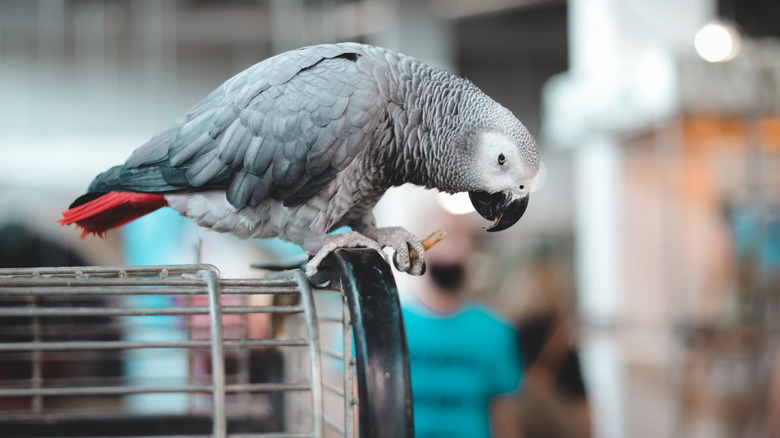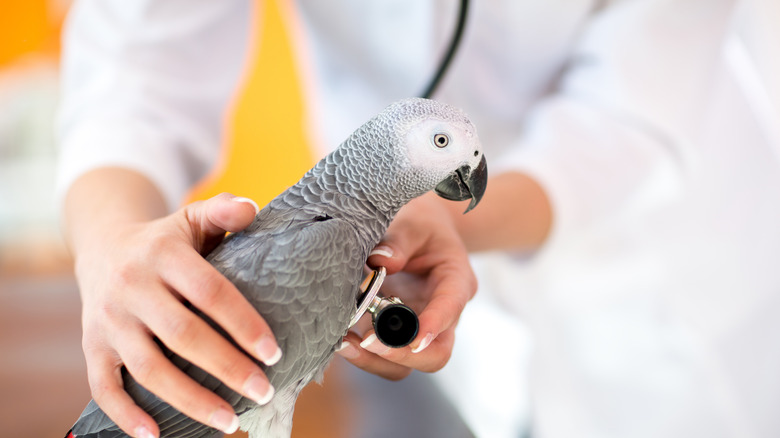The Loving Final Words Of The Einstein Of Parrots, Alex The Parrot
When discussing birds, their intelligence might not be the first thing that comes to mind. However, an article from the Proceedings of the National Academy of Sciences of the United States of America (PNAS) states that birds actually have cognitive abilities that are similar to that of primates. Moreover, PNAS notes that parrots specifically demonstrate cognitive abilities that are unlike anything else seen in other birds. As Suzana Herculano-Houzel, a neurosurgeon from Vanderbilt University explains, "For a long time having a 'bird brain' was considered to be a bad thing: Now it turns out that it should be a compliment." Perhaps no other bird demonstrated this more than Alex, an African Grey parrot.
According to My Modern Met, Alex was adopted by Dr. Irene Pepperberg from a Chicago pet store in 1977 when he was only a year old. All That's Interesting writes that at the time, Pepperberg was a researcher at Purdue University, and according to NPR, her goal was to uncover the cognitive skills of Grey parrots. Although the species is known to speak, their brains are also the size of a walnut, bringing into question their true ability to communicate. That being said, it took awhile for Alex to warm up to Pepperberg. Once he did, she began to train him using a method called the model/rival technique.
His abilities were mindblowing
In simple terms, NPR explains that the model/rival technique involved two trainers demonstrating an object to each other while Alex viewed this interaction. Pepperberg would show an item to the trainer and name it. The other trainer would then repeat the word and Pepperberg would hand them the object and vice versa (via the Massachusetts Department of Elementary & Secondary Education). If Alex repeated the word, he would be given the item as a reward. My Modern Met writes that Pepperberg and the trainer would switch positions to ensure that he understood that the pair were communicating. Eventually, Pepperberg's diligence paid off as Alex developed abilities that were impressive, to say the least.
The Alex Foundation states that he learned 100 voice labels for an array of items, colors, and concepts. Per the American Association for The Advancement of Science, he was also able to categorize objects by color, size, and material. Alex had math skills and could add two different objects together if their sum was six. He could order number magnets correctly from one through eight (via Scientific American). The British Library reports that he could say and understand the meaning of certain words and phrases including "no" and "come here." For example, Alex would say "no" when he didn't want food or certain toys.
Alex died unexpectedly
According to the British Library, Alex could ask Pepperberg and his trainers for specific items by adding "want" to the beginning of a word like water or food. NPR reports that Alex's emotional level was that of a 2-year-old. He had spunk and has been described as being the one that was "in charge" (via The Alex Foundation). Sadly, on September 6, 2007, Alex died from what is believed to be either a heart attack or stroke. He was 31 and had undergone a physical earlier that week that had showed no signs of poor health. The Alex Foundation notes that genetics likely played a role in his death.
NPR states that the last words that Alex spoke to Pepperberg were "You be good. I love you." Pepperberg said that she loved him too (per USA Today). Alex then asked "You'll be in tomorrow" and Pepperberg said "Yes, I'll be in tomorrow." She described the loss as "devastating"; Pepperberg had been working with Alex for 30 years at that point. It was thought he would live to be 50. Even so, Alex proved that birds, and specifically parrots, are far more perceptive than what was previously believed.
Recent studies show that this likely due to a high number of neurons found in their brains (via PNAS). In 2012, Pepperberg told the Scientific American that she wished Alex had lived longer. She added, "These brains can do, if not exactly what an adult human can do, really advanced behavior that nobody expected them to be capable of."


